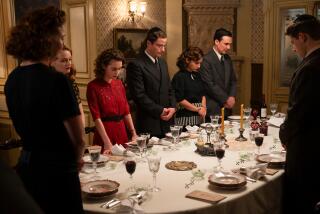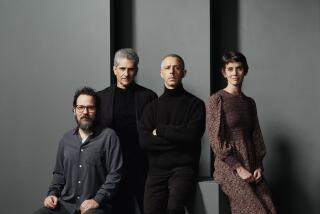Review: ‘The People vs. Fritz Bauer’ brings a largely unknown Nazi hunter to light
It’s called “The People vs. Fritz Bauer,” but this involving, based-on-fact German drama is really about Fritz Bauer versus everybody else, not the other way around.
All but unknown in this country, Bauer was a major crusader against Nazi influence in post-World War II Germany and the key player in 1963’s Auschwitz trials, the first time German criminal cases were brought against Holocaust perpetrators. Bauer has been the subject of major museum exhibitions and numerous books, and this film was a considerable success in its homeland, winning six Lolas (the German Oscars), including best picture and best director for Lars Kraume.
One aspect of Bauer’s life that was not made public until a decade after his death was his crucial involvement in the celebrated 1960 Israeli capture of top Nazi Adolf Eichmann, caught hiding out in Buenos Aires, a scenario that is at the heart of this engrossing film.
The real Bauer can be seen in an old black-and-white newsreel clip that starts things off, talking passionately about Germany being the land of both Goethe and the Nazi Party, of all cultures having light and dark sides. And of the necessity of providing his country’s young people with the truths their parents avoided.
This may sound rather tame in the 21st century, but in the years just after the war in a Germany filled with men in powerful positions eager to hide their past as key Nazi functionaries, it couldn’t have been more controversial.
Bauer was a German Jew who’d spent time in a concentration camp and finished the war in exile in Denmark. He wanted to expose those individuals not out of revenge or “righteous anger” but because he believed a new democratic society could not take hold in his homeland without that kind of accountability.
Energizing the entire film, in fact powering us past its more conventional aspects, is the compelling performance of veteran German actor Burghart Klaussner, who captures Bauer’s firebrand intensity exactly.
Unable to relax and quick to take offense, the kind of irascible chain smoker who plays chess with himself, Klaussner’s Bauer sees enemies and obstacles to his quest everywhere he looks. It’s not that he’s paranoid, he’s simply perceptive.
Movie Trailers
“Fritz Bauer” opens in Frankfurt in 1957, with its namesake, the attorney general of the German state of Hesse, knocked out by an accidental combination of red wine and sleeping pills, something his enemies, particularly Paul Gebhardt (Jorg Schuttauf) of the Federal Office of Criminal Investigation, try to paint as a suicide attempt.
Simultaneously, in Buenos Aires, we hear an unrepentant Eichmann giving an interview to a sympathetic journalist talking about his regret at not having killed even more Jews than the millions whose lives were lost.
Back in Germany, Bauer is dealing with frequent death threats and facing continued frustration in his quest to bring former Nazis to justice. “Even my own office is enemy territory,” he complains as underlings frustrate his plans.
But then the attorney general, whose anti-Nazi efforts get a lot of press, receives a letter from a man in Buenos Aires tipping him off that Eichmann is living there under a false name.
Fearful of trusting this news to his fellow Germans, as likely as not to tip the fugitive off, Bauer considers taking the information to the Israeli intelligence service Mossad, even though he’s told in no uncertain terms by his otherwise sympathetic boss that if this action were discovered Bauer would be charged with treason.
Making things even more difficult is that his nemesis Gebhardt has discovered that Bauer is gay. In a Germany still living under Nazi-era stringent anti-homosexual laws, being caught (or entrapped) in actionable behavior would also lead to arrest and prison.
To emphasize this aspect of the story, director Kraume and his co-screenwriter Olivier Guez (author of a book on Bauer) have created composite character Karl Angermann, a young public prosecutor in Bauer’s office who’s married but still retains a discernible interest in the male sex.
Though actor Ronald Zehrfeld (whose credits include both “Barbara” and “Phoenix” for director Christian Petzold), won a Lola for his work here, these aspects of “Fritz Bauer” are not as compelling as the thrills of the hunt for Eichmann. Even though the result of that endeavor is known, seeing what a near thing it was never fails to engage.
MPAA rating: R for some sexual content.
Running time: 1 hour, 45 minutes.
Playing Laemmle’s Royal, West Los Angeles, Town Center 5, Encino, Playhouse Pasadena.
“The People vs. Fritz Bauer.” An involving film, a major award-winner in Germany, about the real-life anti-Nazi prosecutor who had a secret hand in Israel’s capture of Adolf Eichmann. - Kenneth Turan
See the most-read stories in Entertainment this hour »
More to Read
Only good movies
Get the Indie Focus newsletter, Mark Olsen's weekly guide to the world of cinema.
You may occasionally receive promotional content from the Los Angeles Times.







